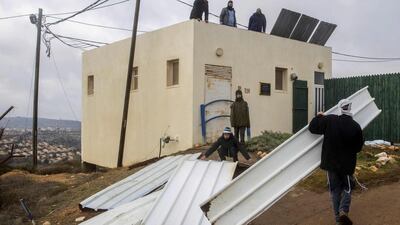AMONA OUTPOST, WEST BANK // Residents of a wildcat Jewish settlement in the occupied West Bank on Thursday rejected a proposal to leave voluntarily, raising fears of violence as an evacuation deadline nears.
The Amona outpost, home to some 40 families, is under a high court order to be evacuated by December 25 since it was found to have been built on private Palestinian land in a case that has taken on international importance.
The residents’ rejection led to concerns the army would move in imminently to clear them out, leading dozens of youths to stream into the hilltop outpost in windy and bitterly cold weather in the middle of the night.
Many of them, alerted to the decision by social media, crowded into a small synagogue and dozed in sleeping bags on the floor, while others stayed in their cars or simply walked the streets.
After sunrise, some of the more extreme youths, wearing knitted Jewish skullcaps with sidelocks dangling, spread nails on roads along with stones and wooden poles.
Several took up position on top of a water tower while waving an Israeli flag. They also hauled an empty dumpster with them for unclear reasons.
A spokesman for Amona residents who has lived in the outpost for 14 years said they had not been given any notice of when an evacuation could happen.
Asked whether he was concerned that the youths’ presence in the outpost would lead to violence, he said: “I’m worried about the government inflicting pain on people – needless pain.”
“There is no difference between Amona and Tel Aviv,” said Eli Greenberg, a 43-year-old father of eight, referring to Israel’s economic capital located within its internationally recognised borders.
“There’s no reason to take us out of here,” he said.
The dispute over whether to demolish the outpost northeast of Ramallah has taken on international importance because of concern over settlement expansion in the West Bank, occupied by Israel since 1967.
Israeli nationalist politicians, settlement advocates and Amona residents have resisted the move, and the international community is watching closely over whether the court order will be obeyed.
All Israeli settlements in the West Bank, including annexed east Jerusalem, are seen as illegal under international law, but Israel differentiates between those it has approved and those it has not.
Settlements such as Amona are called outposts – those that Israel has not approved.
After recent efforts to pass a bill to legalise it failed, the state presented residents with what it described as a way to relocate them to nearby plots.
But following an 11-hour debate, residents rejected the offer, which they said was in fact to relocate only 12 of the families to nearby plots considered available.
The other 28 families would move to temporary housing in the nearby Ofra settlement as the state sought a long-term solution, said a spokeswoman for the regional Binyamin council, Eliana Passentin.
“It was a proposal that held nothing in it,” Amona residents said of the state’s offer. Israeli officials have told local media that there will be no other offer.
There are concerns over how any evacuation will play out.
In 2006, the demolition of nine permanent houses in the outpost led to clashes between settlers and Israeli security forces.
Settlements are seen as major stumbling blocks to peace efforts as they are built on land the Palestinians see as part of their future state.
But the settlement movement wields significant power in Israeli politics.
Key members of Prime Minister Benjamin Netanyahu’s coalition, seen as the most right-wing in the country’s history, openly oppose a Palestinian state and advocate annexing most of the West Bank.
Such religious nationalists point to the Jewish connection to the land from biblical times.
After the Amona residents’ vote, a group of seven extremist rabbis issued a statement suggesting security forces not participate in an evacuation.
Kalmen Barkin, a 20-year-old from Jerusalem, was among those gathered in the Amona synagogue before dawn.
He said he did not advocate violence and would passively resist.
“When they come to take you, grab on to something,” he said.
“We’re going to probably be mostly in public buildings – barricade ourselves in the public buildings.”
* Agence France-Presse

